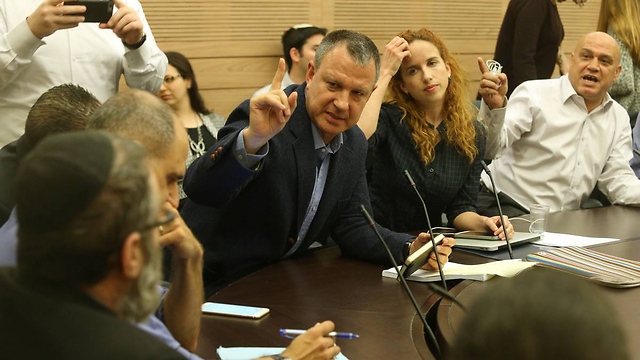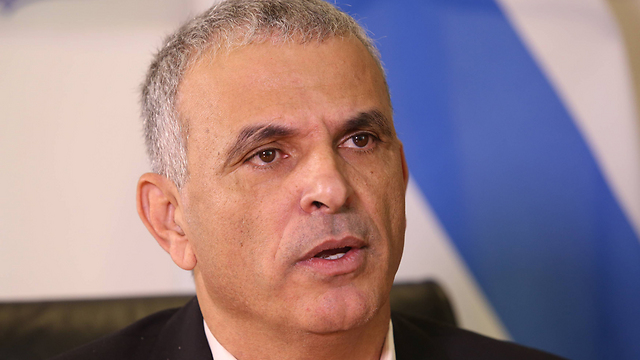
This week's boost to the defense budget wasn't an isolated incident. Last week, the committee approved the transfer of NIS 317 million to the World Zionist Organization's (WZO) Settlement Division, and NIS 3 billion to defense.
Zionist Union MK Stav Shaffir, who heads the Knesset Committee on Transparency, regularly attends Finance Committee meetings. Two years ago, she filed a petition against the Finance Ministry and the Finance Committee against this system of moving budgetary funds from one place to another in this manner. The petition was heard at the Supreme on Tuesday.
"According to Basic Law: The State Economy, the Finance Ministry presents the government with the budget each year, which is then presented to the Knesset for approval in the form of a proposed bill," MK Shaffir said. "In the first year of my term, I discovered that a moment after the budget passes through the Knesset, the Finance Ministry brings to the Finance Committee thousands of requests for changes, and changes the funds' destination, without oversight or work plans."
The 2015-2016 state budget was only approved on November 19, 2015. "That means that from a financial planning standpoint, the Finance Ministry could have included all of these expenses (in the budget)," she said. "That's why it's very surprising that two weeks later, the Finance Ministry presented the Finance Committee with a long list of budgetary changes, which currently stand at NIS 42.6 billion."
"The budget passed, there's no justification to change it now," Shaffir said. "The changes they've made aren't just comprised of surpluses that weren't used by other ministries, but also of budgetary transfers and changes. That means that they might be taking money from the Construction and Housing Ministry's budget or from the National Insurance Institute's budget, and transferring it to the Defense Ministry."
According to MK Shaffir, funds transferring system works like this: Each week the Finance Ministry raises a large number of "budget transfer" requests to the Knesset's Finance Committee, while "MKs don't get enough time or the right tools to supervise this."
"The committee members approve all of the transfers, and they have no ability to monitor how much money was cut, for instance, from the health budget, and how much was added, for example, to the Defense Ministry. How much was sent over to settlements and the Settlement Division, and how much was taken from the National Insurance Institute. The transfer sums have accumulated into billions, and that's done without seeking the approval of the Knesset."
Shaffir asserted that the Finance Ministry knew in advance, before passing the budget, that they'd need added funds for defense, "but they intentionally didn't include these funds. The Finance Ministry knew in advance that it was going to take that money from somewhere. The money isn't falling down from the sky, and if they know they'll have to take that money, they know that it'll be cut from other budgets.
"That's why they pass a fictitious budget," she said. "Now we see the real budget, and what they wanted to do with the budget and intentionally didn't do for political reasons and in an effort to present the public with a different picture of the budget, while in reality they're doing something completely different. It's simply a joke."
Professor Dan Ben-David, an economist at Tel Aviv University and a public policy expert, explained that the way in which the added funds are managed is part of a much larger problem – a lack of budgetary transparency. "You can't look at the State of Israel's budget and really understand who will get what. For instance: How much does the entire settlement enterprise cost, how much we spend on the ultra-Orthodox sector, how much on culture and sports - and not just on politically sensitive things. No one has a clue."
Professor Ben-David emphasized that due to this problem, long-term initiatives are impractical in Israel. "It's not that there's a lack of money," he said. "The question is what you spend that money on. But nobody has a clue, and that is why you can do things by transferring funds from ministry to ministry. There's no mechanism tracking the surpluses."
The Finance Ministry said in response: "We welcome all cooperation and any improvement of the procedures and budgetary management mechanisms. We believe that many meaningful changes have been done in the way the state budget, and budgetary transfers, are managed. Having said that, the court did not accept MK Shaffir's broad interpretation of the limitations on budget transfers. We will continue to act with transparency and in line with the attorney general's instructions in constructing and managing the state budget, out of a responsibility for the government's fiscal operations."



















